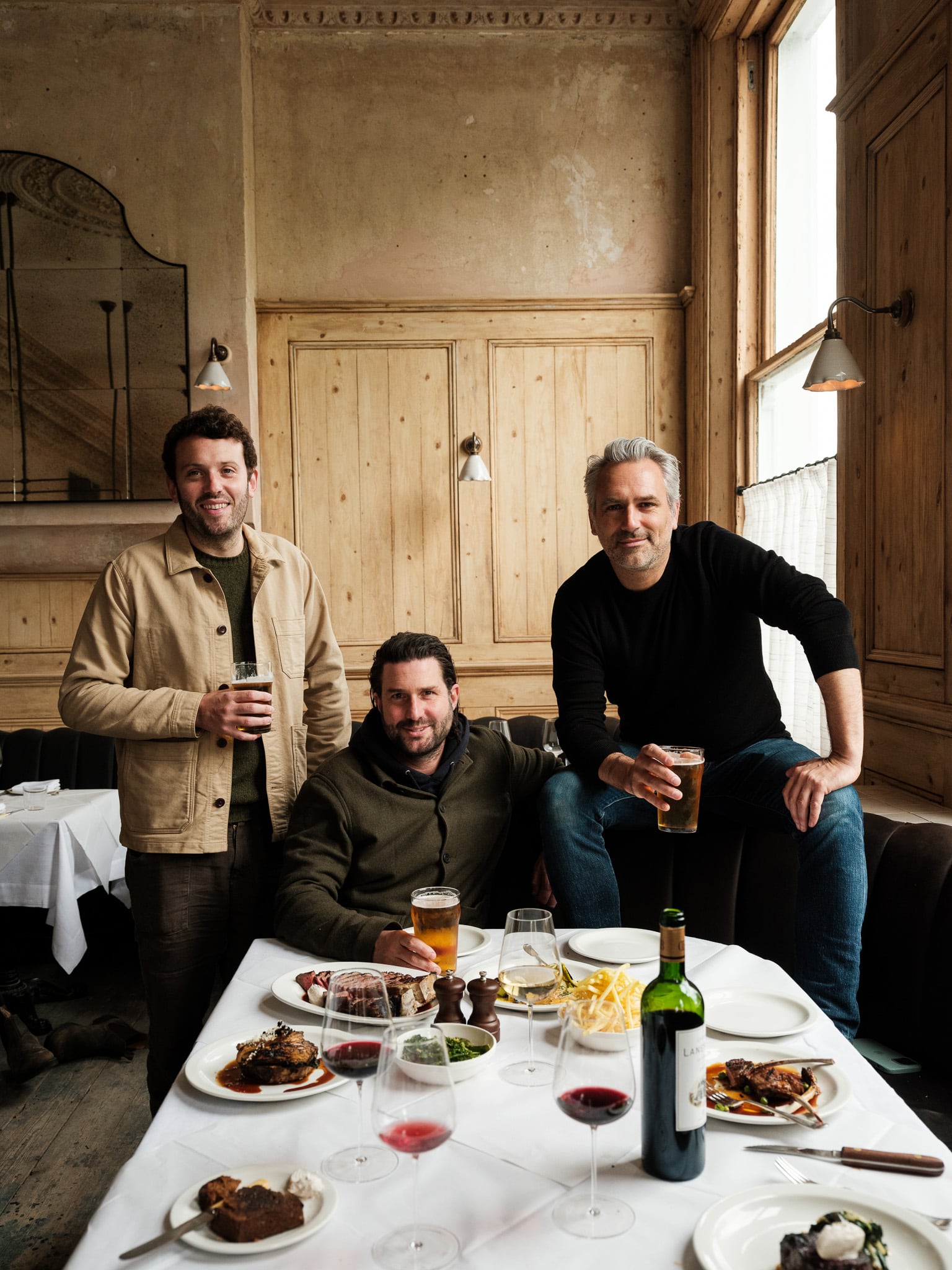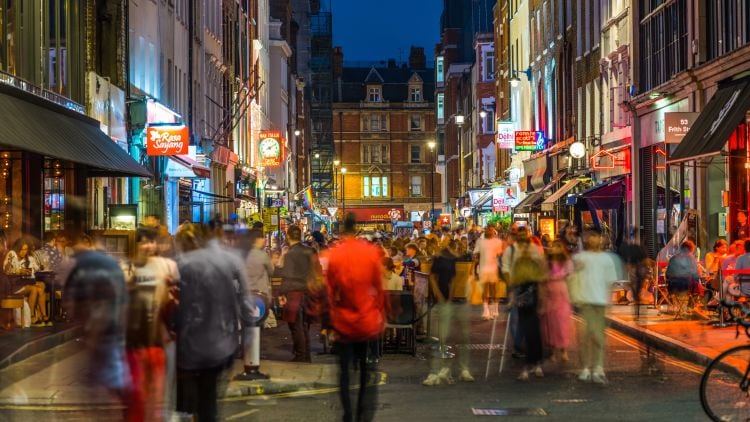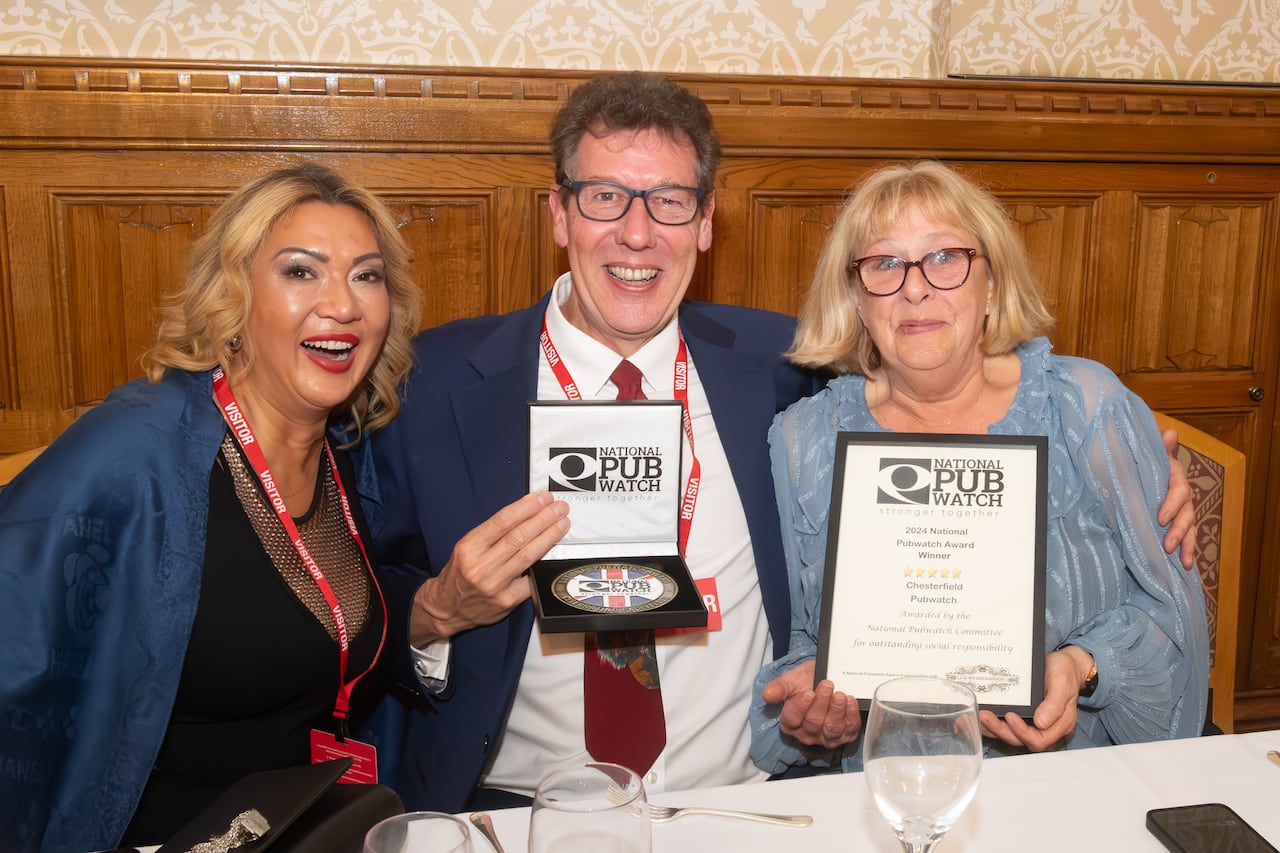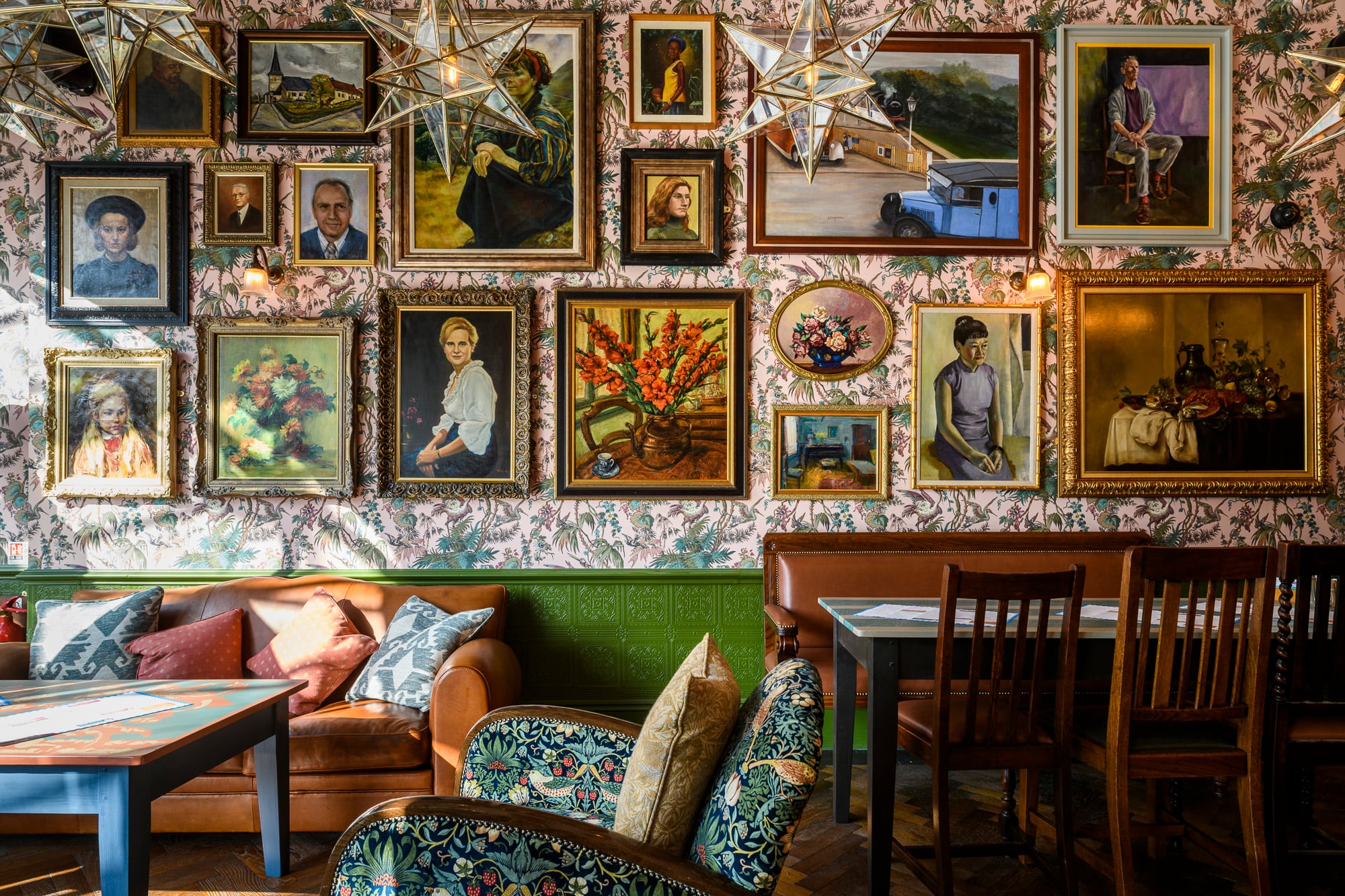For London, certainly, it would appear the premium pub is riding high across the capital, with new, well invested, well curated operations springing up, offering an experience that’s a notch above the norm.
And modestly leading the vanguard of this explosion in “Super Pubs” is the Public House Group, founded just three years ago by three friends and hospitality industry veterans, Phil Winser, James Gummer and Olivier van Themsche.
“Public House Group was born out of the Pelican initially, and that was us looking at opening an individual site,” says Winser
Childhood friends Winser and Gummer had started talking before Covid, thinking about the concepts of neighbourhood and community. Gummer had a small restaurant in Notting Hill and Winser had just moved back from the United States.
“I’d been in hospitality as well and we were both feeling a little bit burnt out by the industry at that time, as lots of people were. We started discussing things we loved in the hospitality sector and started talking pubs and what pubs meant to us, and James said the pub at the end of his street had gone bust and it’s a really great site. Why didn’t we get together and do it? So we did!”
Van Themsche was quickly roped in, a long term contact of Winser from his time in the US and the trio teamed up to create the latest London sensation - and the Pelican was born.
One-off project?
Initially the trio assumed it was a one-off project, but like all true pub entrepreneurs they didn’t stop there! “It was off the back of that and having enjoyed the process so much we decided to start Public House Group three years ago.”
Gummer says they were partly inspired by the pandemic: “During the pandemic, that community, that local part of hospitality is what people missed so much - people weren’t looking for the brand new opening, they wanted to go back to their favourite local, places they had an affiliation with.”
Winser adds the pandemic gave them the chance to look at the industry through a different lens, one almost of “excitement or nostalgia” to help them create their first operation.
“We thought about what would a pub that we love to go with our friends look like, and those were the parameters we put around it - one rule we had was anyone who worked on the project - from contractors and painters to suppliers - would we want to have a pint with them?”
That attention to detail and focus on creating a community offering paid off, he says: “We’d come from restaurant backgrounds and seeing how people interacted with the space seeing how people kind of came for a journey of an evening, or a moment, and how they used it was refreshing.
“And that’s when the three of us said, could we do more pubs and how would we structure a business knowing all the difficulties?”
And more pubs followed in quick succession - the Bull in Charlbury, Oxfordshire, The Hero in Maida Vale, the Fat Badger at 310 Portobello Road, and the Coach in Clerkenwell.
Structured for success
The speed of that growth is down to creating a strong central team, says van Themsche: “We got funding from a large family office that gave us the means to hire all the right people and put that team in place to first acquire the Bull in Charlbury, and then the Hero, then the Coach and 310 Portobello, and we’ve been able to open all those sites one after the other because we’ve got that structure.”
Although he admits it’s expensive, it has allowed them to open the new operations not at the expense of the existing sites, and they’re now growing the teams from within. He says that they were lucky that despite the challenges the sector faces, some people still want to invest in pubs.
He claims that was due to consumer confidence: “The places that are the hardest to get a reservation right now in London are pubs. And some people recognise that and there is access to the right investment for pubs, new pubs and new groups.”
However van Themsche admits that the rapid expansion might not have been entirely by design: “We looked at lots of sites, we loved the building, loved the bones and we’d make an offer, and then sometimes they all come back and say ok - and we were like, how are we going to do this?! So we almost surprised ourselves in the first year to basically move on these sites at the same time.”
And now of course, people are queueing up to offer them sites, but Winser says they are picking carefully, choosing sites near to their existing operations, with the exception of the Bull, and focusing on the existing estate: “We’re really trying to stay focused on our own strategy and plans, and pour everything into living and breathing within these sites.”
While the majority of sites are London-based, the Bull remains the outlier, but for Winser and his colleagues it made sense - the site was in the area that he and Gummer grew up and amongst many of the farmer suppliers that work with the wider business - something Winser is passionate about, ensuring his pubs produce is seasonal and British-grown.
“The only other industry that struggles as much as hospitality and pubs is farming, but we’re so passionate about food and where it comes from. So having a relationship with the food producers is important. The Bull is really at the heart of it, and enables us to have conversations with those food producers.”
The Hero of Maida Vale
Having opened their second site, The Bull, the team returned to the Capital and set about the reopening of the Hero in Maida Vale, an experience that saw considerable excitement from the community.
Gummer says: “While it was closed for renovation, no one knew who was coming in yet, but everyone was just excited to have their local pub back.”
“It was crazy,” says van Themsche, “when we were about to open the doors, people were already waiting outside, and you could see the emotion. People were so deeply excited, it was amazing. People really care about pubs, it’s part of their social life.”
They see that as a real responsibility. “We feel very lucky to be able to be custodians of these buildings because we hope this will be a pub after we’ve gone,” says Winser. “That’s why when it comes to the renovations we try and pour so much love into not just fixing them for the next four years, but fixing them for the next generation to take them on. We’re custodians of the moment.”
Investment is extensive, although Winser points out the largest part of the investment goes into the bits people don’t see, back of house, plumbing, wiring etc. But design is done in house and there’s a minimalist, yet premium, feel to the look of each pub. “We try and strip these buildings back initially to reveal all the features, and try and highlight those.”
While the trio are clearly part of the explosion in high-end boozers popping up across the capital, The Devonshire, The George, The Hound and The Blue Stoops, to name a few, Winser doesn’t consider themselves in the same league and certainly didn’t set out to be in such a club.
“This all started with the Pelican really, and if you take what we spent on the Pelican compared to any of those, I promise you, you wouldn’t believe, we’re nowhere near what those guys are spending on pubs!
“The industry likes to bracket people very quickly, and we’ve been put in this new premium pub, whatever you want to call it.”
However, he doesn’t reject the comparison, but Gummer says it’s not intentional: “We talk to a lot of people about what makes a good pub and it’s not about being more premium for us, it’s trying to marry that drinking element with the food element. And the food element at the Pelican is, a bit like the interiors, really simple - it’s worlds away from the gastropubs from before.”
Strict rules
Winser says they set some “pretty strict rules” for themselves on what their iteration of a pub would be. “It was about having a menu that all food within a few certain ingredients was from the UK and grown in the UK, it was taking the best producers we could find and doing as little as possible to the food. And applying the same principles within the spaces themselves, finding UK producers of lights, furniture, paint and wood and create spaces that connect with UK soil. And having fun!” He adds.
The same ethos on food extends to beers, and they’re keen to ensure that the beer offer is exclusively from British breweries, says Gummer. “And the number of sleepless nights, and conversations with locals who said ‘if you haven’t got a Peroni on, no-one’s going to come in’ - we were terrified by that.”
To limit that, he said they initially stocked Camden Hells, as they thought it was a halfway house, but after opening they were surprised: “Almost immediately we found that the Portobello Pilsner would outsell Hells by ten to one, because the team liked the fact they had met Rob, they knew he would drop a keg off if we ran out, and that story became such a bigger part of our offering than the fact that people hadn’t heard of the beers.”
And that reaction from customers has given the team confidence to stick to those roots, Winser says, and stay true to their initial vision.
One of the biggest challenges the group has faced in its short tenure so far has been the challenges posed by local councils which they described as “demoralising”.
“We’d love to see some closer support on a local council basis. We feel we’re trying to invest a lot, not just financially, and we’re constantly facing huge challenges at the local council level, constantly battling and they make it really difficult for us,” says Winser. “We’re trying to co-operate and be respectful and listen. We’re ticking every box we’re asked to tick, but still they don’t seem to listen to us, and that fundamentally has to change if we want hospitality businesses to keep opening, councils need to listen to the businesses.”
“It feels like we’re rowing against the current,” adds van Themsche, pointing out that the council attitudes are at odds with the communities using the pubs.
But what does the future hold for the group? More sites it would seem. Van Themsche says they’re about to start the refurb on the Coach in Clerkenwell and they’ve recently taken on another site in Marylebone which is undergoing renovations and Winser is excited about plans to grow its own production unit, producing produce for the business, which at the moment he says remains “very small scale”.
And, of course, consolidating the impressive success that they’ve already achieved, but ultimately, the success of the group is down to one simple thing - ensuring the customer experience is key, says Gummer.
“You can’t continue to grow, no matter how well you’re structured, if you don’t get the product right. And I think it’s just all about focusing on trying to make sure every single customer that’s generous enough to choose to spend money with us, you care about making sure they have the best time possible. The rest can take care of itself.”
And a genuine passion for the sector and sense of enjoyment is putting wind in their sails, Winser adds: “The honest truth is that we just really love it! We love the characters we’re meeting, the teams we’re building. We wake up happy and enjoying what we’re doing and as a result, that drives us.”





